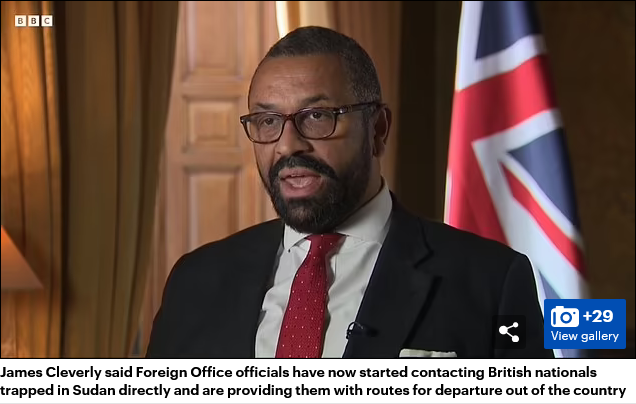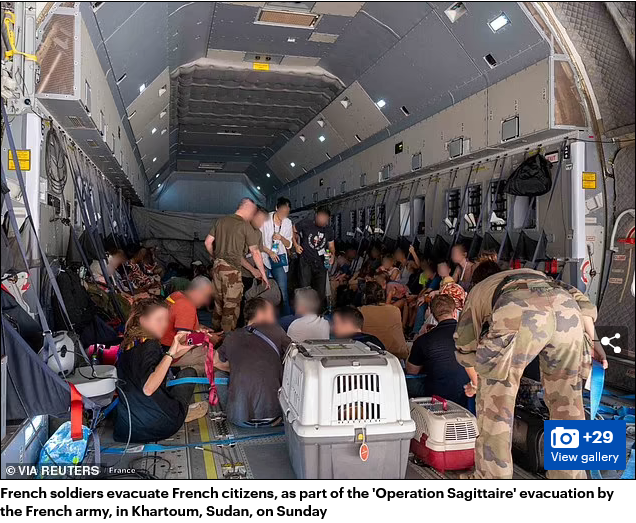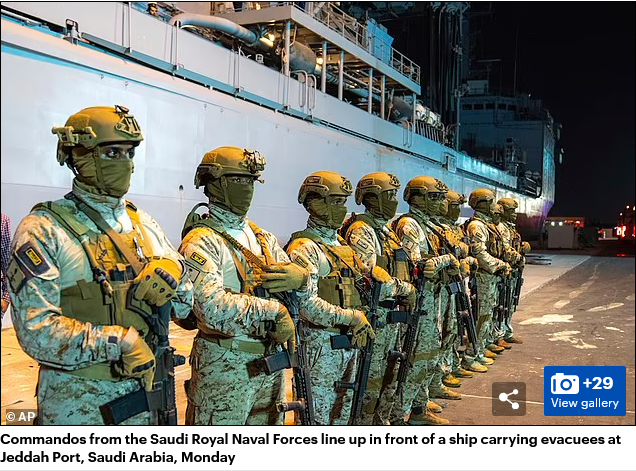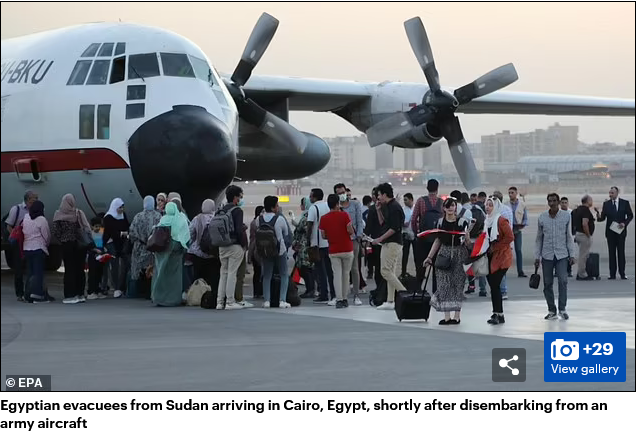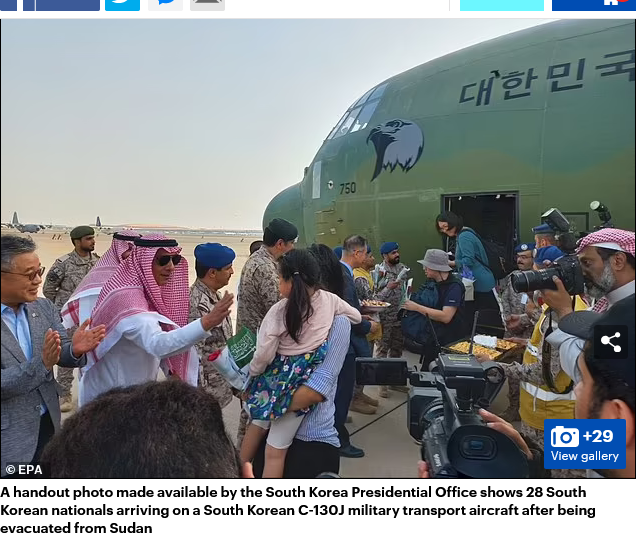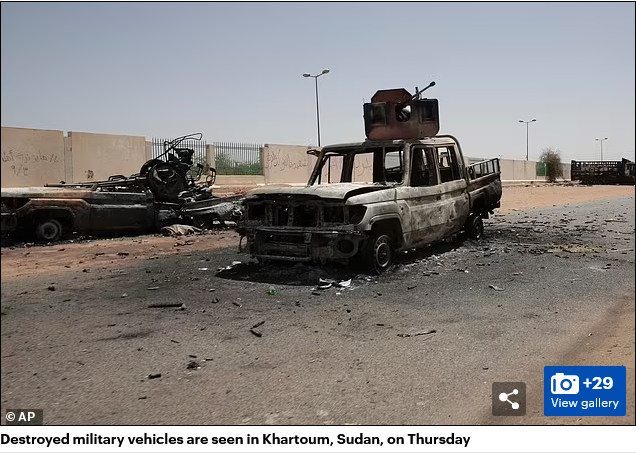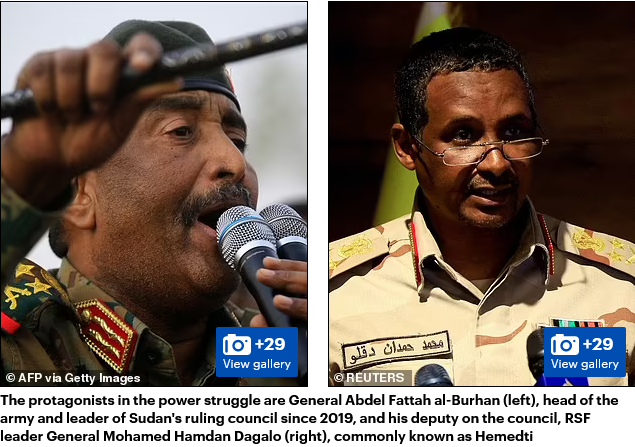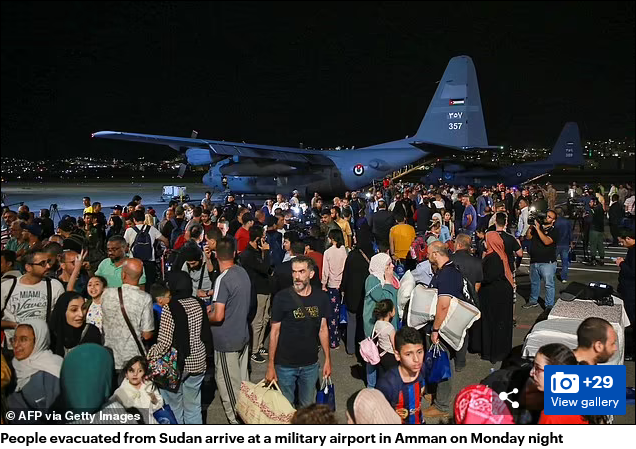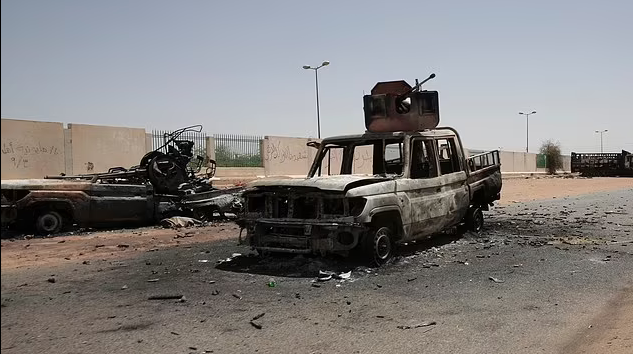
Military flights will take ‘thousands’ of nationals with a UK passport out of the country as three-day ceasefire comes into effect
- UK government is now coordinating evacuation of its nationals from Sudan
- A ceasefire between two warring factions in Sudan has now been agreed
- Are you a British national affected by violence in Sudan? Please contact Rachael.Bunyan@mailonline.co.uk
The UK government will begin evacuating British citizens trapped in Sudan today, Foreign Secretary James Cleverly said after he was accused of ‘abandoning’ thousands of civilians in the war-torn country.
Military flights will now evacuate at least 2,000 British nationals with a UK passport from an airfield outside the capital of Khartoum as a three-day ceasefire came into effect.
Mr Cleverly said Foreign Office officials have started contacting British nationals trapped in Sudan directly and other exit routes are being considered, with two UK Navy vessels having been prepared for a possible evacuation.
The Foreign Office said priority will be given to family groups with children, the elderly and individuals with medical conditions.
It said British nationals should not make their way to the airfield unless they are called, and warned the situation remained volatile, meaning the ability to conduct evacuations could change at short notice.
Cleverly announced the evacuation would begin today after the government faced criticism over its decision to only evacuate diplomats and their families – all while scores of other nations have managed to evacuate hundreds of civilians.
Five Britons were among scores of civilians who were evacuated from Sudan aboard a Saudi Arabian Navy vessel last night – but efforts are now focused on saving the thousands more UK nationals who are trapped there.
Last night, British troops landed in Port Sudan, a fairly stable city in the northeast of the country, on a scouting mission to rescue UK civilians caught up in the conflict.
France, Germany and Saudi Arabia have each carried out hundreds of evacuations, including some Britons.
So far, the UK has only extracted diplomats and their dependents. A group of around 30 were escorted by Special Air Service troops from Khartoum to an airbase 20 miles north of the capital on Sunday morning. There, they boarded RAF aircraft and were flown to a British base in Cyprus.
US Secretary of State Antony Blinken said on Monday that Sudan’s warring generals had agreed to a 72-hour ceasefire starting on Tuesday (10.00pm GMT on Monday), after 10 days of urban combat killed hundreds, wounded thousands and sparked a mass exodus of foreigners.
It comes after the British Ambassador to Sudan, Giles Lever, emerged from his London home on Monday to assure stranded people that every effort was being made to evacuate them to safety. He said he had returned to Britain for a holiday from Khartoum and circumstances forced him to stay on and help from London.
Speaking outside his home in leafy Wimbledon, Mr Lever told MailOnline: ‘I came back here for a scheduled holiday at Easter and have been unable to return. I had been working solidly on the problems in Sudan for three months before I left.
‘I hadn’t seen my wife at Christmas and my holiday was approved by my boss. But I cannot get back there.
‘But it is incorrect to say that the embassy had been abandoned. There was a very senior diplomat, my deputy, in charge while I took leave.’
Germany and France have been at the forefront of evacuations among western nations, and have even rescued British civilians amid criticism the UK Government has been too slow in its response.
France confirmed it had extracted ‘significant’ numbers of foreign nationals from Sudan including Britons, while German Armed Forces evacuated 311 people yesterday morning – with some UK civilians among them, The Telegraph reports.
A British businessman said: ‘The French have been absolutely incredible, amazing, I can’t thank them enough for saving my life.’
At least one French soldier has been left in a critical condition after being shot in the suburbs of Khartoum on Sunday night.
Five Britons were among those on board a Saudi Royal Naval vessel as it extracted its nationals from Sudan. A clip shows 199 people travelling on a ship as it arrives in the Saudi port city of Jeddah on the Red Sea.
Amid warnings that time could be running out to save the more than 4,000 Britons trapped in Sudan, the UK has mobilised troops, aircraft and warships to secure their evacuation.
RAF transport aircraft last night landed in Port Sudan, while two ships based in the Middle East – RFA Cardigan Bay and HMS Lancaster – are being prepared for despatch.
But despite these efforts, British civilians awaiting rescue are coping with diminishing food, water and electricity supplies.
Dr Reem Taha, a trustee of the UK Sudanese Junior Doctors Association, said 70 NHS doctors are among those stranded and communication in the area is difficult. She told The Mirror: ‘Internet services are poor and international calls are not going through. It is rapidly evolving daily. Some areas are under fire constantly.
‘They are NHS workers and we can’t afford to lose NHS doctors. We are worried about them. I think they have lost all hope.
‘The last communication I had from one doctor on Sunday was that he was thinking of fleeing through Egypt. But we don’t know any more.’
The ferocity of fighting in Sudan has created additional problems for evacuation, with Government sources admitting it is more dangerous than the rescue operation out of Afghanistan in 2021. At that time, Kabul was not yet in Taliban hands – allowing for more control over the extraction.
As many as 2,000 UK citizens remain in Khartoum as the fighting continues and a humanitarian crisis worsens. Food and medical supplies are becoming increasingly scarce and gunmen are roaming the streets.
US Secretary of State Antony Blinken announced yesterday that Sudan’s warring generals had agreed to a three-day ceasefire starting from midnight, after previous bids to pause the conflict quickly disintegrated.
‘Following intense negotiation over the past 48 hours, the Sudanese Armed Forces (SAF) and the Rapid Support Forces (RSF) have agreed to implement a nationwide ceasefire starting at midnight on April 24, to last for 72 hours,’ Blinken said in a statement two hours before the truce was to go into effect.
During this period, the United States urges the SAF and RSF to immediately and fully uphold the ceasefire,’ Blinken said.
Blinken said that the United States was also working with partners to set up a committee that would negotiate a permanent ceasefire in Sudan, where the conflict between rival generals descended into deadly violence 10 days ago.
Fighting erupted between Sudan’s armed forces and the Rapid Support Forces (RSF) paramilitary group on April 15 and has killed at least 427 people, knocked out hospitals and other services and turned residential areas into war zones.
‘During this period, the United States urges the SAF (Sudan Armed Forces) and RSF to immediately and fully uphold the ceasefire. To support a durable end to the fighting, the United States will coordinate with regional and international partners, and Sudanese civilian stakeholders,’ Blinken said in a statement.
U.N. Secretary-General Antonio Guterres said that the violence in a country that flanks the Red Sea, Horn of Africa and Sahel regions ‘risks a catastrophic conflagration … that could engulf the whole region and beyond’.
The Security Council planned a meeting on Sudan on Tuesday.
Tens of thousands of people, including Sudanese and citizens from neighbouring countries, have fled in the past few days, including to Egypt, Chad and South Sudan, despite instability and difficult living conditions there.
Foreign governments have been working to bring their nationals to safety. One 65-vehicle convoy took dozens of children among hundreds of diplomats and aid workers on an 800-km (500-mile), 35-hour journey in searing heat from the embattled capital Khartoum to Port Sudan on the Red Sea.
The Government is ‘exploring every single option’ but has no current plan to evacuate British citizens from Sudan, a minister who attended Rishi Sunak’s emergency Cobra meeting has said.
RFA Cardigan Bay and HMS Lancaster were being lined up as options to help people out of the war-torn country, where at least 2,000 UK citizens remain after UK diplomats were removed.
A team of British troops were understood to have been flown into Port Sudan to scope out the options for any rescue mission of civilians.
Foreign Office minister Andrew Mitchell, who attended the Prime Minister’s Cobra meeting earlier on Monday, said ministers would ‘bend every sinew’ to help British citizens in the country if it was possible to do so.
But he warned a concrete plan had not yet been drawn up and urged UK nationals to stay indoors until they hear otherwise.
‘What we have decided to do is to bend every sinew to make sure that if it is possible to do so we help evacuate our citizens, but I can’t tell you how we would do it, all I can tell you is we are exploring every single option,’ he told Channel 4 News.
‘The Foreign Office’s messaging has been absolutely consistent throughout. We have said that there is no current plan for evacuation and we are working on finding a plan.
‘Our strong advice to British citizens is to stay indoors. It’s extremely dangerous out on the streets of Khartoum.
‘If they wish to move because they have better information on the ground than we do in the Foreign Office then they may do so, but they do so at their own risk.’
Commons Foreign Affairs Committee chair Alicia Kearns warned ‘time is running out’ as she urged ministers to get on with evacuations ‘now’.
Meanwhile, Downing Street confirmed British ambassador to Sudan Giles Lever and his deputy were out of the country when violence broke out in Khartoum.
The Prime Minister’s official spokesman said: ‘I think it was around the time of Ramadan, that they were out of the country at that point.
‘There were very senior staff still in the country and both those who were in country and the ambassador have been working around the clock to aid efforts.’
It is thought that if used, RFA Cardigan Bay – currently in Bahrain, and HMS Lancaster – in India, would supplement possible flights out of Sudan.
Any mission would be highly complicated, however, with Port Sudan more than 500 miles from Khartoum.
Mr Mitchell told the Commons that movement around the capital ‘remains extremely dangerous and no evacuation option comes without grave risk to life’.
‘Khartoum airport is out of action. Energy supplies are disrupted. Food and water are becoming increasingly scarce. Internet and telephone networks are becoming difficult to access,’ he said in an urgent statement.
‘We continue to advise all British nationals in Sudan to stay indoors wherever possible.
‘We recognise circumstances will vary in different locations across Sudan, so we are now asking British nationals to exercise their own judgment about their circumstances, including whether to relocate, but they do so at their own risk.’
Ms Kearns, a Tory MP, called for swifter action.
‘Time is running out. We need to do the evacuation now,’ she said.
‘Trust at this point is being stretched, trust that we will evacuate them and get them to a place of safety when they are in need.’
Downing Street said the UK will ‘pull every lever possible to help bring about a ceasefire and equally to support British nationals trapped by fighting’.
Some British nationals have said they felt ‘abandoned’ after diplomats were rescued in a night-time evacuation mission, and were organising dangerous private evacuations.
Labour leader Sir Keir Starmer urged the Government to move quickly to help British nationals, telling journalists in south London: ‘There’s deep concern about those that are still there and in fear and real concern about what’s going to happen to them.
‘I do want the Government to do everything it can at pace to help them get out of that difficult situation.’
The European Union’s foreign policy chief, Josep Borrell, said more than a thousand people have been extracted through the combined efforts of member states.
About 50 Irish citizens have been evacuated from Khartoum to Djibouti with the support of France and Spain, with more evacuations planned, deputy premier Micheal Martin said.
William, a UK citizen in Sudan, told the BBC he was forced to ‘go private’ and leave Khartoum on a bus arranged by his Sudanese employer because ‘we’ve had absolutely nothing but nonsense from the Government’.
Iman Abugarga, a British woman who has been sheltering in Khartoum, said she feels ‘absolutely’ abandoned by the British Government.
‘It is shameful how they have mismanaged this situation,’ she told the Telegraph.
Mr Sunak said on Sunday there had been a ‘complex and rapid’ evacuation of British diplomats and their families from Khartoum, a city gripped by an internal battle for control between rival generals.
Hundreds of people have died and thousands hurt in a bloody conflict between the Sudanese army and a powerful paramilitary group known as the Rapid Support Forces.
The prospect of airlifting large numbers of people out of Sudan has been complicated by the fact that most major airports have become battlegrounds, while movement out of the capital has proved perilous.
The current explosion of violence comes after two generals fell out over a recent internationally brokered deal with democracy activists, which was meant to incorporate the RSF into the military and eventually lead to civilian rule.
___
Source here

